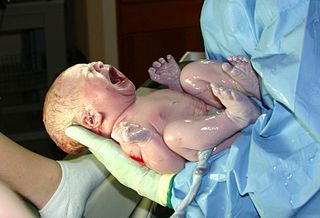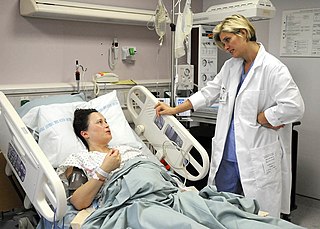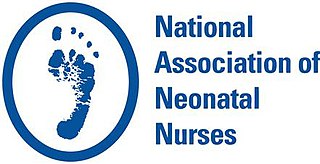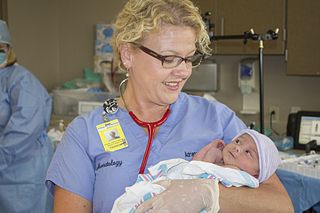Related Research Articles

A respiratory therapist is a specialized healthcare practitioner trained in critical care and cardio-pulmonary medicine in order to work therapeutically with people who have acute critical conditions, cardiac and pulmonary disease. Respiratory therapists graduate from a college or university with a degree in respiratory therapy and have passed a national board certifying examination. The NBRC is responsible for credentialing as a CRT, or RRT,

Neonatology is a subspecialty of pediatrics that consists of the medical care of newborn infants, especially the ill or premature newborn. It is a hospital-based specialty, and is usually practised in neonatal intensive care units (NICUs). The principal patients of neonatologists are newborn infants who are ill or require special medical care due to prematurity, low birth weight, intrauterine growth restriction, congenital malformations, sepsis, pulmonary hypoplasia or birth asphyxia.

A neonatal intensive care unit (NICU), also known as an intensive care nursery (ICN), is an intensive care unit (ICU) specializing in the care of ill or premature newborn infants. Neonatal refers to the first 28 days of life. Neonatal care, as known as specialized nurseries or intensive care, has been around since the 1960s.
Pediatric nursing is part of the nursing profession, specifically revolving around the care of neonates and children up to adolescence. The word, pediatrics, comes from the Greek words 'paedia' (child) and 'iatrike' (physician). 'Paediatrics' is the British/Australian spelling, while 'pediatrics' is the American spelling.

A nurse practitioner (NP) is an advanced practice registered nurse and a type of mid-level practitioner. NPs are trained to assess patient needs, order and interpret diagnostic and laboratory tests, diagnose disease, formulate and prescribe medications and treatment plans. NP training covers basic disease prevention, coordination of care, and health promotion, but does not provide the depth of expertise needed to recognize more complex conditions.
Cardiac nursing is a nursing specialty that works with patients who suffer from various conditions of the cardiovascular system. Cardiac nurses help treat conditions such as unstable angina, cardiomyopathy, coronary artery disease, congestive heart failure, myocardial infarction and cardiac dysrhythmia under the direction of a cardiologist.

In the United States, a Certified Nurse-Midwife (CNM) is a nurse midwife who exceeds the International Confederation of Midwives essential competencies for a midwife and is also an advanced practice registered nurse, having completed registered nursing and midwifery education leading to practice as a nurse midwife and credentialing as a Certified Nurse-Midwife. CNMs provide care of women across their lifespan, including pregnancy and the postpartum period, and well woman care and birth control. Certified Nurse-Midwives are exceptionally recognized by the International Confederation of Midwives as a type of midwife in the U.S.
Nursing credentials and certifications are the various credentials and certifications that a person must have to practice nursing legally. Nurses' postnominal letters reflect their credentials—that is, their achievements in nursing education, licensure, certification, and fellowship. The letters usually appear in the following order:

Critical care nursing is the field of nursing with a focus on the utmost care of the critically ill or unstable patients following extensive injury, surgery or life threatening diseases. Critical care nurses can be found working in a wide variety of environments and specialties, such as general intensive care units, medical intensive care units, surgical intensive care units, trauma intensive care units, coronary care units, cardiothoracic intensive care units, burns unit, paediatrics and some trauma center emergency departments. These specialists generally take care of critically ill patients who require mechanical ventilation by way of endotracheal intubation and/or titratable vasoactive intravenous medications.

Emergency nursing is a specialty within the field of professional nursing focusing on the care of patients who require prompt medical attention to avoid long-term disability or death. In addition to addressing "true emergencies," emergency nurses increasingly care for people who are unwilling or unable to get primary medical care elsewhere and come to emergency departments for help. In fact, only a small percentage of emergency department (ED) patients have emergency conditions such as a stroke, heart attack or major trauma. Emergency nurses also tend to patients with acute alcohol and/or drug intoxication, psychiatric and behavioral problems and those who have been raped.
In the United States, anesthesia can be administered by physician anesthesiologists, an anesthesiologist assistant, or nurse anesthetist.

Neonatal nursing is a sub-specialty of nursing care for newborn infants up to 28 days after birth. The term neonatal comes from neo, "new", and natal, "pertaining to birth or origin". Neonatal nursing requires a high degree of skill, dedication and emotional strength as they care for newborn infants with a range of problems. These problems vary between prematurity, birth defects, infection, cardiac malformations and surgical issues. Neonatal nurses are a vital part of the neonatal care team and are required to know basic newborn resuscitation, be able to control the newborn's temperature and know how to initiate cardiopulmonary and pulse oximetry monitoring. Most neonatal nurses care for infants from the time of birth until they are discharged from the hospital.
Obstetrical nursing, also called perinatal nursing, is a nursing specialty that works with patients who are attempting to become pregnant, are currently pregnant, or have recently delivered. Obstetrical nurses help provide prenatal care and testing, care of patients experiencing pregnancy complications, care during labor and delivery, and care of patients following delivery. Obstetrical nurses work closely with obstetricians, midwives, and nurse practitioners. They also provide supervision of patient care technicians and surgical technologists.

The National Association of Neonatal Nurses (NANN) is a professional organization for neonatal nurses in the United States. NANN was founded in 1984 by five neonatal nurses: Patricia Johnson, Linda Bellig, Tracy Karp, Charles Rait and Donna Lee Loper. Within one year, the association boasted a membership of 3,790.
The National Certification Corporation (NCC) was established for the development, administration, and evaluation of a program for certification in obstetric, gynecologic and neo-natal nursing specialties in the United States. Incorporated in 1975 and governed by a board of directors, NCC's certification program is accredited by the National Commission for Certifying Agencies (NCCA), the accreditation body of the Institute for Credentialing Excellence. By 2009, NCC had awarded over 95,000 certifications and certificates of added qualification.
Certified in Neonatal Pediatric Transport (C-NPT) is the designation in the USA for a paramedic, physician, respiratory therapist, neonatal nurse, nurse practitioner, nurse or physician assistant who has earned certification from the National Certification Corporation in neonatal and pediatric transport. This certificate of added qualification was rolled out in 2009. National Certification Corporation utilizes applied measurement professionals to administer its tests.
A Critical Care Transport Nurse is a Registered Nurse specialized in care in the pre-hospital setting. These are mostly air-medical personnel or critical care transport providers with specialized training and experience in pre-hospital care. Such nurses are required by their employers to seek additional certifications beyond basic nursing licensure and are often required to have three years (minimum) of full-time experience in emergency and/or intensive care. Certifications requirements vary but often include advanced cardiac life support (ACLS), basic life support (BLS), pediatric advanced life support (PALS), neonatal resuscitation program (NRP), trauma nursing core course (TNCC), and Advanced Trauma Life Support (ATLS), in addition to Pre-Hospital Trauma Life Support (PHTLS). Standards also include being board certified in Emergency Nursing (CEN), Critical Care Nursing (CCRN), and Ground Transport (CTRN) or Flight Nursing (CFRN) respectively. In some regions these nurses are authorized to operate base station phones for medical command. Some states allow them to operate entirely under standing orders while on a ground ambulance or air medical unit. Training also includes specific education relevant to the state and its protocols, and often requires the nurse to train with paramedics for a period of time as well as taking an additional exam administered by their medical director before being allowed to operate on a ground ambulance or air medical unit. Many of these nurses hold certifications as Emergency Medical Technicians or Paramedics, and in some states are required to, but it is not the standard of practice.
A women's health nurse practitioner (WHNP) is a nurse practitioner that specializes in continuing and comprehensive healthcare for women across the lifespan with emphasis on conditions unique to women from menarche through the remainder of their life cycle.
A pediatric nurse practitioner (PNP) is a nurse practitioner who specializes in care for newborns, infants, toddlers, pre-schoolers, school-aged children, adolescents, and young adults. Nurse practitioners have an in-depth knowledge and experience in pediatric healthcare including well childcare, and prevention/management of common pediatric acute illnesses and chronic conditions. This care is provided to support optimal health of children within the context of their family, community, and environmental setting. In order to be a pediatric nurse practitioner one must be compassionate, resourceful, good at communicating and have good attention to detail. In the past couple decades, the job of a nurse practitioner has nearly doubled in the United States. Pediatric nurse practitioner numbers have stayed relatively the same. It is expected that the demand for the PNPs will start to increase in our society. This demand comes from children with chronic illnesses which are surviving and having diseases. PNPs are mostly taking over offices over the physicians, but still work side by side.

A neonatal nurse practitioner (NNP) is an advanced practice registered nurse (APRN) with at least 2 years experience as a bedside registered nurse in a Level III NICU, who is prepared to practice across the continuum, providing primary, acute, chronic, and critical care to neonates, infants, and toddlers through age 2. Primarily working in neonatal intensive care unit (NICU) settings, NNPs select and perform clinically indicated advanced diagnostic and therapeutic invasive procedures. In the United States, a board certified neonatal nurse practitioner (NNP-BC) is an APRN who has acquired Graduate education at the master’s or doctoral level and has a board certification in neonatology. The National Association of Neonatal Nurse Practitioners (NANNP) is the national association that represents neonatal nurse practitioners in the United States. Certification is governed by the National Certification Corporation for Obstetrics, Gynecologic and Neonatal Nursing Specialties (NCC).
References
- 1 2 NCC Exam Detail: Neonatal Intensive Care Nursing
- ↑ "What is Neonatal Nursing | NANN". nann.org. Retrieved 2017-05-06.

